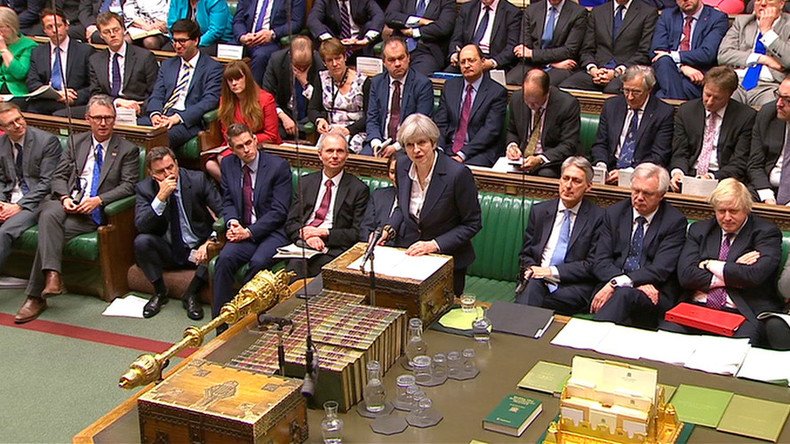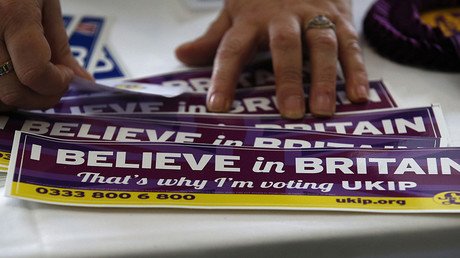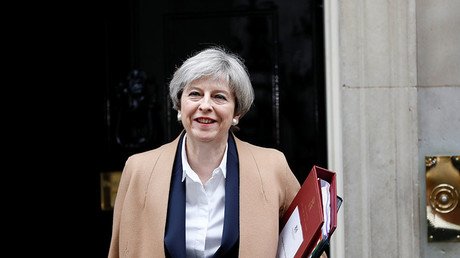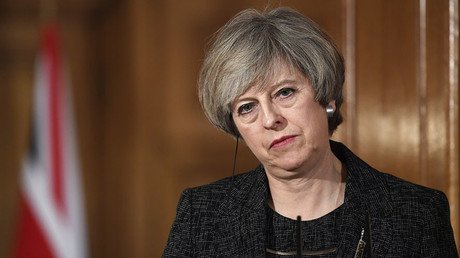Theresa May's manifesto message: 'We are an empire, leave us alone!'

So the British Conservatives published their much-anticipated election manifesto. Unlike the Labour manifesto, nobody, aside from British Prime Minister Theresa May, had seen its contents, the message of which seems to be 'leave us to our empire-building.'
Even her Cabinet ministers were apparently a little shocked at some of its contents, which had been mostly dreamed up with the help of Nick Timothy, Theresa May's own little Rasputin, who, it seems, never communicates with anyone other than to bark May's orders at them. No chance of a leak from him, then.
Following her theft of the 'strong and stable' slogan from Mein Kampf, she gave her manifesto the suitably Mussolini-esque title of "Forward, together!" All that was missing was an accompanying picture of a valiant Aryan soldier, chest puffed out, hands on the drone control unit, ready for the next crusade. The strange thing is, though, the Tories would much rather not have a manifesto at all; they'd much prefer just a two line version reading "it's your patriotic duty to vote Tory. Now f*ck off and leave us alone."
The Tories' clear aim is a repeat of 1931. Held in the wake of a run on the pound and the near collapse of the banking system, this was the last time any party received a majority of votes in a general election, and it delivered 470 seats to the Tories. Labour was left with 52 (down from 287). One of the major factors behind this victory was a Labour party bitterly divided between its leadership and the vast majority of its MPs. In a mirror reversal of today's situation, Ramsey MacDonald - Prime Minister of a minority Labour administration elected in 1929 - had invited the Tories into government to implement a brutal austerity budget of wage and benefit cuts opposed by most of his own party. This was the most gratuitous self-destruction of the Labour party at the hands of its own right wing until - well until this June 8th I imagine.
The Tories, of course, massively capitalized on this disarray: their 1931 manifesto (comprised of a few skimpy paragraphs) wrote that: "to complete this work [of dealing with the economic emergency] it is imperative that the government should have a national mandate giving it freedom to use whatever means may be found necessary after careful examination to effect the end in view. It is necessary that in place of a small Parliamentary majority we should have a stable government with a large majority backed by the resolution of a great majority of the electors. The country must show in no uncertain matter that it will have nothing to do with a party whose program could only convert a situation grave already into one of chaos and catastrophe." The Tories would provide a "stable government," which Labour would threaten with its "chaos"; therefore it is in the national interest that the Tories get the biggest majority possible. Sound familiar?
The Tories were demanding from the electorate what became known as a 'doctor's mandate': a mandate, that is, not to implement any specific policies declared in advance, but rather to do whatever they 'diagnosed' as being necessary; that is to say, precisely the blank check Theresa May is now demanding. The electors gave the Tories what they wanted; and the result was mass unemployment, a viciously cruel 'means test' for benefit recipients, and total devastation of working class communities; not to mention support for growing fascism on the continent, including secret support for Mussolini's invasion of Ethiopia, the appeasement of Hitler, a blockade of the Spanish Republic and mass City financing of the Nazi government.
Clearly, the Tories don't really want to give too much away about what's coming next this time around. In fact, they would much rather just focus on Jeremy Corbyn's peacenikery, his suits, and his outrageous sympathy for oppressed Irish Catholics.
After all, this strategy had worked wonders for the Tories in 2015. Then, the claim was that a Labour victory could - horror of horrors - lead to the democratic representatives of the Scottish people actually having some influence in government. Worse: the Tories claimed, with zero evidence, that Miliband was not sufficiently committed to Britain's weapons of mass destruction program. And besides, on a personal level, he was a rotter. Michael Fallon brought together all three strands of this story in his comment that "Miliband stabbed his own brother in the back to become Labour leader. Now he is willing to stab the United Kingdom in the back to become prime minister.”
What he meant was that Miliband could offer to scrap Trident to lure the SNP (who have a longstanding policy of opposition to nuclear weapons) into a coalition. Total fantasy, of course, but the English went nuts for it; the Conservatives, against all expectations, won 60 percent of all English seats.
Replace the Scottish for the Irish, and 'Miliband the rotter' for 'Corbyn the loser' and the exact same strategy is in place today; no surprise, as the Tory campaign is being managed by the same Mr. Lynton Crosby who masterminded the 2015 victory. And there is no reason to suspect it won't work again.
It is a simple formula, but an effective one: collective attacks on one of the UK's minority nationalities (I guess it will be Wales' turn in 2020) combined with personal attacks on the leader; but most importantly, all underpinned with the central message: WE ARE A F*CKING EMPIRE, the rest of the world had better not forget it, and these Labour losers must not be given a chance to f*ck it all up. None of this requires a manifesto, simply a series of attacks on the opposition and a few dog whistles to English chauvinism.
So why did they bother with a manifesto at all? The simple answer is the House of Lords. Incredibly, it was the Lords, more than anyone else, who managed to put some kind of spanner in the works of the Tories' 'austerity' drive. In October 2015, they defeated then-Chancellor George Osborne's bill to slash £4.4billion from tax credits - benefits paid to workers on low incomes. According to the Salisbury convention - one of the archaic unwritten rules which make up Britain's non-constitution - the Lords should not block legislation arising from the government's manifesto commitments. But this particular policy had not appeared in the manifesto, and so the Lords had the right to throw it out.
Theresa May wants to make damn sure this does not happen again. While she would love a 'blank check' to do whatever she wants, regardless of whether or not it breaks a manifesto promise, the only way she can be sure to quieten Lords opposition is to spell out her intentions in the manifesto. That way, under the rules of the 'Salisbury convention', they will have to let it pass. Hence her inclusion of a social care policy - promising to end to state-provided social care for the elderly for nine-tenths of homeowners. Just the sort of the thing that would normally give the Lords a fit.
The policy is only in part about saving money for the state. More importantly, it reflects the desperate need to create markets in an economic situation in which the mega-rich are flush with unprecedented piles of cash, but have nowhere to invest it. No one is investing in actual productive industry anymore, as markets are already glutted, and we are in the midst of a severe overproduction crisis. Companies have more money to invest than ever before. UK corporate profits in the United Kingdom reached an all-time high at the end of last year, with over £105 billion registered in the final quarter of 2016. The situation is the same in the US, where just one company, Apple, now has $250 billion of cash in its reserves. As Vox recently pointed out, the company "would have to launch about 25 iPhone-sized projects every month just to avoid having its cash pile continue to grow." - that is to say, without even denting this massive hoard of wealth.
Poor old Western corporations, eh? Record hoards of cash and nowhere to invest it. And kids in South Sudan think they've got problems.
May's social care plans, along with all her other austerity measures and privatizations are mainly aimed at addressing this problem, the only problem with which they are genuinely concerned. Where the state steps back, private companies will step in to provide the service - at inflated prices and reduced quality, if previous experiences of privatization are anything to go by. But the point, the purpose, is that it creates investment opportunities for billionaires seeking to make more profits from their cash.
So far, so good. Or at least it was until Theresa May learned that, surprise surprise, this ingenious measure did not go down well with the major part of her support base - the actual pensioners themselves now expected to foot the bill for this massive withdrawal of the state's responsibilities. Indeed, this so-called 'dementia tax' (as it would particularly penalize those with long-term care needs such as dementia) was all the papers could talk about last weekend. So, on Sunday night, she did as all poll-hungry politicians do in such circumstances, and did a U-turn, promising now to 'cap' the levels of funding which individuals would have to stump up themselves. But all that did was guarantee the negative headlines continued, not only attacking the policy itself but now also the U-turn, demonstrating, in the words of one commentator, that May was now looking, not so much "strong and stable" as "weak and wobbly." The entire thrust of May's campaign was being undermined, as papers competed in running lists of May's other U-turns, and Andrew Neil gave her a bruising interview, noting that "this must be the first time that a party has broken a manifesto policy before the election." The story of 'shaky May,' her indecisiveness and incompetence completely dominated Monday and Tuesday's headlines and news bulletins.
Of course, no one is talking about that now. Indeed, the story may as well have been from last century rather than earlier this week.
You see, another of Crosby's signature electoral techniques is what he calls the 'dead cat' maneuver. Boris Johnson, who employed Crosby for his two mayoral election campaigns, described it like this: “There is one thing that is absolutely certain about throwing a dead cat on the dining room table – and I don’t mean that people will be outraged, alarmed, disgusted. That is true but irrelevant. The key point, says my Australian friend [Crosby], is that everyone will shout, ‘Jeez, mate, there’s a dead cat on the table!’ In other words, they will be talking about the dead cat – the thing you want them to talk about – and they will not be talking about the issue that has been causing you so much grief.” This was precisely the impact of Michael Fallon's statement about Ed Miliband back in 2015; up to that moment, Labour's poll ratings had been improving, and media coverage was focused on Miliband's pledge to crack down on tax avoidance. Fallon's comment was so wilfully provocative that it ensured that, from then on, his allegations would dominate the agenda, and the tax issue was effectively buried and forgotten.
It looks like ISIS has just handed the Conservatives the most disgusting 'dead cat' imaginable. Repayment, perhaps, for services rendered to their campaign against independent secular governments in the Middle East.
The statements, views and opinions expressed in this column are solely those of the author and do not necessarily represent those of RT.

















